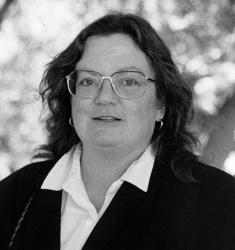Campus News
In Memoriam: Margaret I. Fitzsimmons
We mourn the recent passing of our esteemed colleague and cherished friend, Margaret Fitzsimmons, professor emerita. She was born in Berkeley on January 16, 1947, the daughter of Edward and Elizabeth (nee Sauer) FitzSimmons. After an undergraduate degree in psychology from Stanford (1969), she chose geography as the focus of her graduate work, earning her […]

We mourn the recent passing of our esteemed colleague and cherished friend, Margaret Fitzsimmons, professor emerita. She was born in Berkeley on January 16, 1947, the daughter of Edward and Elizabeth (nee Sauer) FitzSimmons. After an undergraduate degree in psychology from Stanford (1969), she chose geography as the focus of her graduate work, earning her M.A. from Cal State Northridge in 1975 and a Ph.D. in Geography from UCLA in 1983. Her dissertation examined the interaction of nature, labor, and capital in the agricultural industrialization of the Salinas Valley and was a masterful analysis of the political ecologies and environmental history of this important agricultural region. She was recognized for the best paper based on a dissertation with the American Association of Geographers J. Warren Nystrom Award. Her dissertation publications included an important paper in the journal Economic Geography.
She was appointed as an assistant professor of Urban Planning at UCLA in 1980, where she strengthened the department’s environmental concentration. In 1991, UCLA gave her a distinguished teaching award for the many new courses she introduced, for her expertise in teaching theory, and her work as a mentor to countless students, including many students of color. Her 1989 article “The matter of nature” in the radical geography journal Antipode, which theorized the social construction of nature as a deeply human relation to the environment, has been cited hundreds of times. She also wrote a book on water in California, Thirst for Growth, with Robert Gottlieb. In 1994, she was recruited as a professor to join the Department of Environmental Studies at the University of California, Santa Cruz, where she continued her deep dedication to student mentoring and teaching, her thoughtful support of her colleagues, and her commitment to a sustainable and socially just agriculture.
Margaret was brilliant, articulate, widely read, passionate about social and environmental justice, incisive, and incredibly kind. She was sought after for the role of discussant at national meetings of social scientists and geographers. Some of her breadth of knowledge was derived from and inspired by her beloved grandfather, long-standing UC Berkeley geographer Carl O. Sauer, who was well-versed in ecological and botanical knowledge. Her approach to agricultural studies combined modes of thought and knowledge spanning from political ecology to environmental history to ecosystem processes. Thus, she became a strong bridge between natural and social scientists in the department and an asset to the development of interdisciplinary research by our faculty and graduate students on sustainable food systems. Margaret continued to collaborate with, mentor, and support students and colleagues after her retirement, including hosting dinners for new faculty engaged in food studies. Her last publication entitled, “Pest management within the environment: challenges for agronomists, ecologists, economists and policy makers,” was a collaborative study with two agroecologists of social factors driving pest pressure and pest control options in Pajaro Valley strawberry production over the last 100 years.
At this time, there will be no formal service or public event. You might take a moment to remember Margaret in the gardens, redwoods, and oak woodlands that she loved. In lieu of flowers you may wish to honor Margaret with a donation to one of the charities she supported such as Environment California, KQED Public radio, Walnut Street Health Clinic, the Earth Island Institute, or Monterey Bay Aquarium. Messages can be left on the virtual tribute wall connected to the obituary for Margaret https://pacificgardenschapel.com/ or can be sent to her friend, at diana.liverman@gmail.com, who will share them with Margaret’s friends and family.